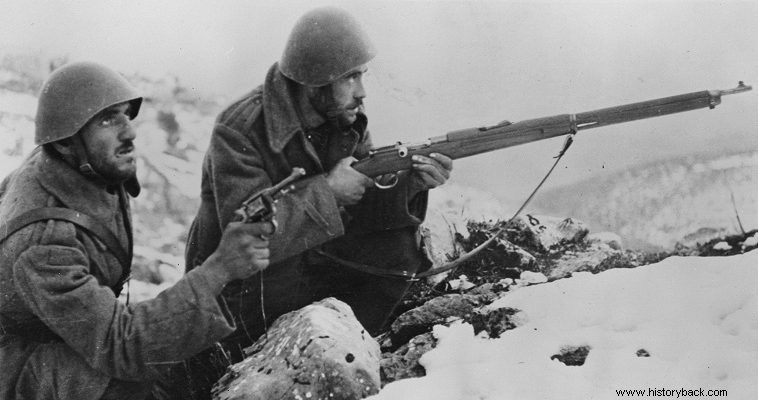
It is often said, completely wrongly, that the Italians were cowards, that they ran away from the Greeks, that they did not want to fight, and even that they lost on purpose to bring the Germans into the Balkans! Of course, all of the above has nothing to do with reality, unless we accept that the 15,000 Greeks who fell in Albania killed themselves.
The Italians were neither cowards, nor did they take it upon themselves when they heard the chant "Air". They fought and even fanatically, in many cases, especially the elite sections of Alpinists and Versailles. The explanation for the Italian defeat has nothing to do with the courage of the Italian soldiers, but with the intelligence of its leadership and the general view of the war against Greece by the fascist Italian leadership, with the level of training of the Italian Army and with moral preparation of this army in view of the invasion of Greece.
According to the "luminaries" of fascism (Mussolini, Ciano, Gaida, De Vecchi, Praska, Sodu) Greece would be easy prey. The Greeks believed, they would not fight, because they were politically divided and militarily disorganized. They took care to convey this opinion to all levels of the army. Unfortunately for them, neither was happening. The Greeks were only divided and did not welcome the Italians and they were anything but disorganized militarily.
The Metaxas government had established an excellent network of intelligence, at home and abroad, so it knew a lot. For example, the Greek services knew that the occupation of Albania by the Italians was imminent, before the British and the French even suspected it.
He even informed the British, who did not know the slightest thing and were informed of the event as such, the day after the event! Also, the low-key policy followed by the Greek government in the face of the hundreds of Italian provocations, lulled the Italians to sleep, making them believe that they would face no resistance.
Thus the Italians ventured to attack with forces clearly less than what they could dispose of (only 9 divisions in the whole of Albania). Of these forces, approximately half (4 divisions) were deployed defensively, in Western Macedonia and the Yugoslav borders.
The Italian military leadership believed that it could also apply the German lessons of blitzkrieg against Greece. In her view, however, she failed to consider three important factors. First, the highlands of the Greek territory, especially in the area of Epirus. Secondly the Greek preparations and the excellent organization of the ground by the Greek frontline forces.
Third, finally, the morale of the Greek Army which was excellent, not only because it was fighting for the right, but also because the Greek Army of the time was really well trained, with excellent and above all experienced war officers – almost all officers from the rank of lieutenant colonel and above were veterans of at least one war, and several senior officers were veterans of up to 5 wars (Balkan War I, Balkan War II, World War I, Ukrainian Campaign, Asia Minor Campaign).
In compensation for this, some Italian soldiers had fought in Spain, without particularly distinguishing themselves in Ethiopia, where they even needed chemical gases to crush their mischievous African opponents.
This fact, of the catalytic superiority of the Greeks over their rival officers, is unfortunately overlooked. And yet he was clearly one of the main factors in the Greek victory. It is no coincidence that the Greek Army presented a very high proportion of dead officers among the wars of the Second World War.
The Greek officers of the time were not limited to commanding their divisions, of course, as the Italians did, with few exceptions. From lieutenant to general they were close to their men, shared their hardships and in many cases died with them.
The Greek soldier of 1940 also excelled his opponent, in training and consequently in morale. The Italian general Prasca, amazed by the effectiveness of the Greek mortars, expressed the opinion that the Greeks were using special ammunition. Of course no special ammunition was used. It's just that the men had undergone such intensive training that they used their weaponry to the best of their abilities. The same can be said about the Greek gunners, who with their accuracy scared even the German veterans.
The Greek Army, poor like its homeland, had no room for waste. Every bullet, every shell had to take place. And this can only be achieved through education. Also, hard training is a catalyst for the development of high morale, since the well-trained soldier knows his capabilities and has complete confidence in himself.
In addition to these, the Greek soldier, throughout the thousands of years of his history was stubborn in defense, but also excellent in attack, possessing something more than courage, an incomprehensible feeling of self-sacrifice and philanthropy. Precisely these virtues of his, which they knew well thanks to their experience, were developed and exploited to the fullest by the administrations, as a result of which they achieved what they achieved.
These very elements surprised the Italians, leadership and army. Instead of seeing their opponents flee in disorder before their tanks, their mass of artillery and their hundreds of aircraft, they saw an enemy charging in and stopping the tanks with blankets, ignoring fire and firing at the aircraft , even with his rifles.
The surprise of the Italians peaked when, according to the description of an Italian officer, "they saw these demons rushing screaming, with a lance as a weapon"! The Italians invaded Greece confident of their success, since - as their newspapers and that infamous Gaida wrote - "the war was no longer fought with spears and swords, but with tanks and heavy artillery".
But the Greeks proved to them that the new version of the spear, the lance, but also the sword of the cavalry, had not lost their value at all.
PANTELIS D. KARYKAS
